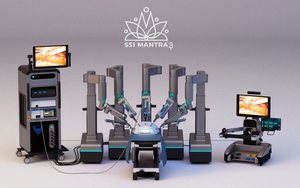New Delhi, Dec 9 (IANS) The Central Drugs Standard Control Organization (CDSCO) has granted regulatory approval to SSI Mantra, the first made-in-India surgical robotic system, for telesurgery and teleproctoring, signifying a monumental leap in surgical robotics, the company said on Monday.
Developed by Gurugram-based SS Innovations, the system aims to decentralise and democratise access to surgical expertise. It also addresses critical gaps in healthcare, particularly in remote areas, where access to specialised medical care has often been a challenge.
“Telesurgery and teleproctoring have been a dream in the making for over four decades, and today, it has finally come to life. With the technology and bandwidth available now, we can truly decentralise and democratise surgical expertise, reaching patients and surgeons in the most remote parts of India and the world,” said Dr. Sudhir Srivastava, SS Innovations Founder, Chairman, and CEO.
“This innovation is a game-changer, especially for our country, where much of the population lives in smaller towns and rural areas. By enabling remote surgical intervention, we are reshaping the future of healthcare,” he added.
Recently, SS Innovations launched SSI Mantra 3 — the next generation and the most advanced version of the Mantra surgical robot system, which also achieved a historic feat by completing India’s first human trial in telesurgery.
The surgery — a robotic cholecystectomy — took place between the World Laparoscopy Hospital and the SSI Headquarters over a distance of 5 km, using the seamless connectivity of Airtel’s fiber optic network with no perceptible delay. Cholecystectomy is a surgical procedure to remove the gallbladder.
SSI Mantra 3 is highly advanced and is designed to enhance surgical precision, efficiency, and patient outcomes by integrating the latest advancements in robotic surgery.
In October, SS Innovations announced the completion of over 2,000 surgeries, of which 124 were cardiac cases. The robotic system ensured zero mortality and no device-related adverse events.
The system has also been used in 789 general surgeries, 621 urology surgeries, and 269 gynecology procedures, demonstrating its versatility across multiple specialties.
–IANS
rvt/


Comments are closed, but trackbacks and pingbacks are open.